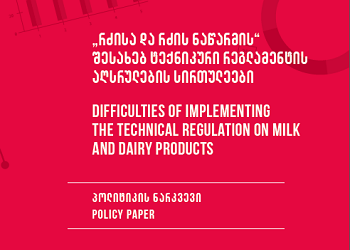- Details
Windbreaks have a significant positive impact on the economic, social and environmental dimensions of sustainable development. While the positive impacts of windbreaks have been acknowledged by various stakeholders, due to Georgia’s poor socio-economic conditions, most existing windbreaks have been destroyed and require restoration.
Research identifies the need for state intervention in order to:
• Protect soil from erosion;
• Increase soil productivity and thus agricultural production;
• Regulate windbreaks so that interested parties can work within this field;
- Details
On April 3rd, 2015, the government of Georgia adopted the Technical Regulation on Milk and Dairy Products that was enacted on August 1st, 2015. The technical regulation aims “to determine unified principles for regulating production, processing, and distribution of milk and dairy products as well as the protection of customers’ rights”. It provides definitions of terms “milk and dairy products”. The main objects of the regulation are raw milk and cream, drinking milk and cream, lactic acid products, butter, cheese and cheese products, and byproducts of milk (products obtained while processing dairy products).
- Details
The European Neighbourhood Programme for Agriculture and Rural Development in Georgia (ENPARD Georgia) was implemented in March 2013. The main goal of the ENPARD program is to reduce rural poverty in Georgia.1 The total budget of the program is 102 million EUR. Through close cooperation with the government, civil society, and farmers, ENPARD is working on achieving three main goals:
• Building capacity and supporting government institutions in the reform of the agriculture and rural development sector;
• Improving employment and living conditions of rural populations by strengthening farmers’ cooperation skills and access to resources;
• Promoting diversified social and economic opportunities in rural areas, particularly for women and youth, in due respect to the environment and the cultural heritage.













